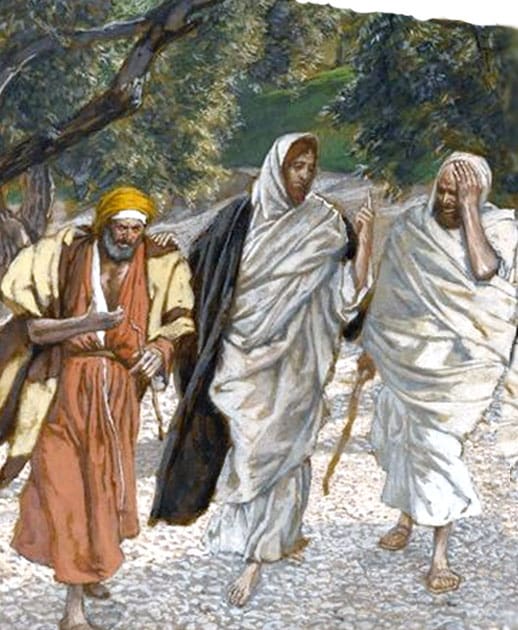Suppose you just discovered you were instantly cured of painful cancer? Did someone wipe out a longstanding debt? You learn you are expecting a long-desired child? What would be in your heart and mind?
Most likely, you would immediately want to share the good news with those who mattered in your life.
A thought exercise… imagine you just rose from the dead! Would you immediately blurt it out and hug those you shared your life with?

Jesus on the road to Emmaus
Up until now, I never thought about “how” Jesus shared his news with the two disciples on the road to Emmaus. Actually, I never paid attention to the “how” he shared the good news in each of the appearances after his resurrection.
Then it struck me … Jesus has just risen from the dead. Why didn’t he blurt it out when he joined the two?
He came to them where they were on their journey. He walks with them… listens. They were shell-shocked and upset at the crucifixion and death of Jesus. Their hopes were dashed… all was for naught.
Notice … Jesus doesn’t simply start telling them to turn back to Jerusalem. He walks with them in their doubt and pain. Jesus first listens to two people who are going the wrong way. Why?
Then, and only then, does Jesus help them to make connections with what they knew in their tradition… but did not understand.
He knew them well. They would have missed the bigger picture. They would have been stuck back waving the palm branches for a king as they understood kings.
Making connections with what they were taught… but did not really understand
So he sets it in the context of their lives and what they had been taught from the time of Moses. He reminded them they had been taught about a suffering servant who laid down his life as an example of loving others, even enemies.
They begin to sense something stirring in them. Their hearts begin burning within them… the work of the Holy Spirit.
As they share a meal with Jesus, it dawns on them. We need to go back to the community and rejoice with them.
They make the decision to turn around – not because Jesus commanded them or said it would be a good idea. They needed to celebrate together their encounter with Jesus.
Similarities with Pope Francis’ synodal process
Isn’t this how Pope Francis looks to lead the Church in the midst of our lives?
He calls us together. He wants each of us to share our own confusion and hear one another’s pain and hopes. In the midst of our pain and confusion he wants us to listen to the Spirit poured out on Pentecost.
Who knows where it will take us? As we listen, we will once connect the dots. It is not about us and our limited understanding of what happened. It is about the Good News of Jesus for every person today.
Francis, as Jesus earlier, urges us to open our hearts to Jesus present today, especially the least of our brothers and sisters…
He encourages us to come to grips with what we know… but have not understood. We are, each of us, God’s children!
Isn’t that what “synodality” is about?
The process encourages us to break bread together. Jesus meets people wherever they gather in his name to discover the bigger picture.
We gather to celebrate and serve one another in memory of the “suffering servant” pouring out his life, even for those who tortured and killed him.
Do we, in memory of him
- Listen to one another’s pain and confusion
- Serve and wash one another’s feet?
Originally posted on Vincentian Mindwalk







0 Comments